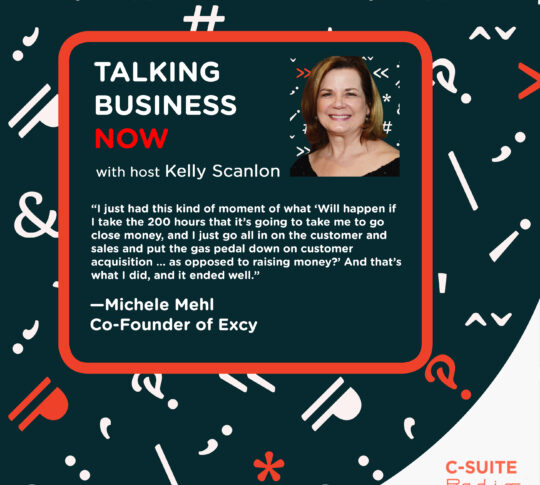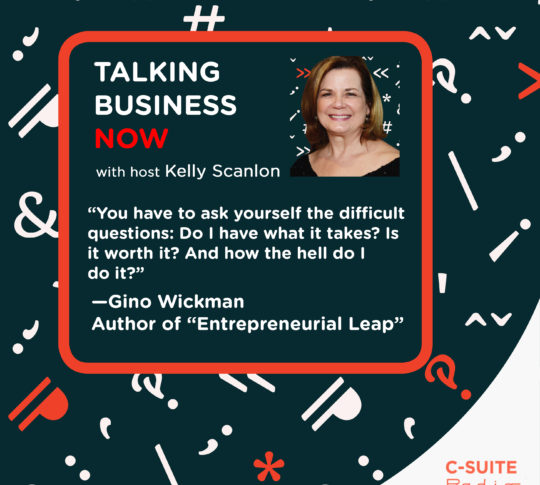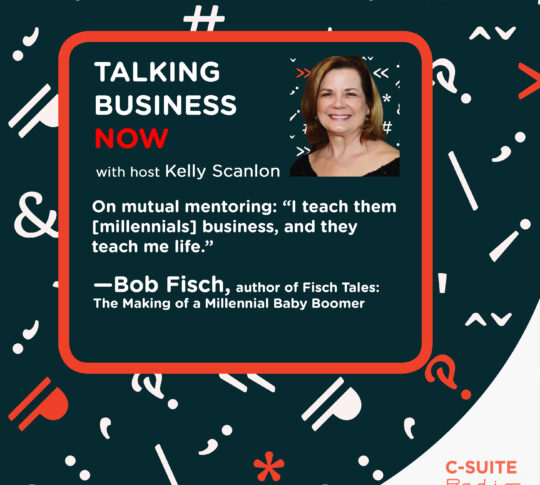Listen to the podcast episode here, or read the transcript below for Thinking Outside the Building — A Leadership Strategy.

Welcome to Talking Business Now. I’m your host, Kelly Scanlon. Thank you for joining us.
We’re Talking Business Now with Rosabeth Moss Kanter, one of the most prominent names in leadership and business. Dr. Kanter holds the Ernest L. Arbuckle professorship at Harvard Business School, specializing in strategy, innovation and leadership for change. She guides leaders worldwide through teaching, writing and direct consultation to major corporations, governments and startup ventures. Recently Professor Kanter released a groundbreaking book called Think Outside the Building: How Advanced Leaders Can Change the World One Smart Innovation at a Time. It’s based on her leadership work at the Advanced Leadership Institute.
In this episode of Talking Business Now, Professor Kanter talks with us about the new book and how experienced leaders and aspiring entrepreneurs can best apply their knowledge to some of the most challenging issues we’re facing today. Welcome, Professor Kanter.
Rosabeth Moss Kanter: Thank you very much. I’m delighted to be with you.
Kelly Scanlon: You’re racking up quite a lot of acclaim for Think Outside the Building. I mean, among other accolades, the Financial Times just chose it as one of their books of the month. Congratulations.
Rosabeth Moss Kanter: Thank you very much. It’s very gratifying, because I feel that this message is so needed right at this particular moment.
Kelly Scanlon: You’re leading me right into my first question, because as I mentioned, this book is based on your experience working with leaders at the Advanced Leadership Initiative. Why did you decide to write a book about leadership?
Rosabeth Moss Kanter: It is certainly based on the experiences I’ve had with successful leaders making transitions. It’s also based on the number of startups I’ve worked with, on managing change and transformation inside companies and outside. I felt that at this moment we particularly need to understand how to deal with so many of the challenges that occur outside the boundaries of a particular company, beyond your team, beyond your organization.
And, in fact, as we talk, the coronavirus problem is sweeping America and the world. It’s only one of many issues, including disasters, natural disasters, fires and tornadoes. And, so, it’s a time when the disruption to business as usual is not coming just from new technology, which always brings about change.
It’s also coming from problems that exist that we haven’t quite solved—climate change, economic and racial and gender disparities are still a concern, shortfalls in education, health issues and how we have a better public health system. These are problems that if you’re a leader running your own company, you’re going to have to contend with it one way or another.
For some, these are business opportunities. You can use your technology to get on the bandwagon for health screening, better tests or for greener products. But, you also have to understand that the complexities of leading on these issues are beyond what we use to tell leaders to do. So, I feel they need a new skill set, a new toolbox and I’m trying to provide that.
Kelly Scanlon: When you talk about this, these advanced leadership skills, what are you referring to exactly when you say advanced leadership? So many of these problems have been with us for many, many years—in some cases, decades—and we still haven’t solved them. We’ve had some good leaders over those years. So, what do you mean when you talk about advanced leadership? What else is needed?
Rosabeth Moss Kanter: Yeah, so we’ve had good leaders. But, it’s true we are still grappling with some of the same problems. And I think that’s because even great leadership sometimes gets too confined by the structure of existing institutions. And, so, leaders operate in silos. Each sector operates alone. Business doesn’t necessarily talk with government. NGOs, nonprofits and civil society live in a world of their own.
Climate change is a good example here because there are many, many, many coalition’s working on climate change. But, for a long time, the world of finance, the world of business wasn’t really in conversation with the environmental activists, for example. And government bureaucracies have their own particular territories to guard.
So one of the stories I tell in my book is about a banker who really cares passionately about the fate of the ocean and knows how much economic damage can be created if we don’t fix the oceans, which have a lot to do with climate change on land as well. And one of his approaches was to find a gap, which is there was no real financing mechanism for working on ocean problems because oceans have no sovereignty. No nation owns the oceans. No business owns the ocean. So, his goal was to fill that gap. And that’s a different kind of leadership, because he doesn’t have control either. He had to get coalitions of people from very different backgrounds, very different sectors, very different countries and industries, talking to one another in order to make progress.
Kelly Scanlon: Let’s talk about that for a minute then. There are a lot of good leaders out there in the world. You hear more and more about leadership that wants to embrace social causes. They realize that although profit motive is good, we have to think beyond that as well and they’re wanting to do things to better the world. So, if I have that self-awareness, how do I break out of these silos that you’re talking about? And what are the first steps I need to take in order to start making some kind of a dent or to start creating these kinds of relationships and coalitions that can take us forward?
Rosabeth Moss Kanter: No, that’s a very good observation. We do have good leaders. And we have a lot of well-meaning, well-intentioned people. And, in fact, values are changing. I think social impact is one of the trends of our particular time. It’s more people want to have social impact. More companies want to measure the impact they’re having, which includes for shareholders. But how do you get started?
Well, that’s why my title is called Think Outside the Building. In some ways, you have to leave their familiar territory and at least see what’s happening around you. You have to understand the problems from the ground up.
The new CEO of Verizon, Hans Vestberg, has asked his executives to do at least one new thing a week Be in some unfamiliar situation, do something they had never done before, be in a place they had never been. It expands your mind; it opens your horizons. And then you can take your vague sense that you want to do something about a problem, and you can enlarge it to encompass many more dimensions outside of your own territory, and outside of the people you normally talk to. And, in the course of exploring, you often run into people that turn out to be unexpected sources of new contacts and allies. So, you knock on a lot of doors. My first rule of success in coalition building, and I think in life, is show up. Be there personally and make the connections, and go with the learning attitude. You’re going to let other people teach you because the things you’ve learned in being successful inside an organization or in your career or in your profession may or may not be as valued by some of the stakeholders out there. And you have to listen and learn from them. And then they will listen to you with your knowledge.
Kelly Scanlon: One of the things that you note is that sometimes even the most well-meaning and innovative ventures or enterprises still fall prey to traps—where they end up back in the bureaucracy that they thought that they were doing away with, or that they were not going to let into their venture. And yet it happens anyway. What kind of tips can you give to companies who haven’t fallen prey to that yet and how to prevent it? And, second, if you find out, if you realize, if you have the self-awareness to know that you are back again dealing with this, how do you reinvigorate the company? How do you reinnovate all over again?
Rosabeth Moss Kanter: One thing you need to do is be mindful of what I call Kanter’s Law. I think everybody should have a law named after them, so I call it Kanter’s Law, which is “everything can look like a failure in the middle.” If you’re doing something new and different, if you’re innovating, if you’re trying something you’ve never done before. And it could be the launch of a new product. It could be an attempt to heal social divides in your community. It could be an attempt, like Walmart did, to say we have to do something about gun violence that affected our stores. You start to do something and you reach obstacles that you didn’t know were there because you haven’t been down that road before.
And critics start surfacing. And skeptics. Some people say we’ve tried it before and it will never work. This is familiar to any leader.
Well, the difference between success and failure is often how long you give it before you give up. And there tends not to be a lot of patience in major established organizations. They’re not very patient. They want you to show results right away as though you were doing something that has been done for hundreds of years. And that’s not always possible. You do need patience; you need flexibility. You can’t stick with the original idea just because that was the original idea.
And, again, some companies get trapped because they asked people to come in with exactly on target with their plan. But if you’ve never done it before, a plan is in part a best guess. So, you need the flexibility to pivot, to change tactics, to make modifications. And then you have to check whether the purpose that you had in the beginning is still valid. You check whether you are gaining more allies and supporters or losing them. So is support growing? So in Think Outside the Building, I have a lot of checklists people can use to gauge their degree of commitment to the task they’re working on. And then also to gauge whether they want to keep it going when it hits roadblocks.
Kelly Scanlon: Give them some questions to consider about whether it is time to maybe dissolve, to say, you know, “We gave it our best shot, but we’re not going to keep going.” Do you give them some things to think about as they come to that kind of a decision?
Rosabeth Moss Kanter: Well, when to persist or when to pull out or when to pivot is always a matter of gauging. First of all, does the purpose that you were trying to serve, is it still compelling and important? Sometimes a problem is getting solved by somebody else. Sometimes, you’re a little late to the party. Not always, I think if you have a grand sense of purpose, you frame your idea in terms of a bold dream, it’s likely that you’re going to want to keep on going. But you can also look at the degree of support—is support growing or is it declining? And if you find that your allies are disappearing into other tasks, and it’s getting harder and harder to get people behind you, you might at that point, pull out.
I talked about a few examples in my book, but I’m thinking about something else, a person who had a very good idea first about an app that would count calories and tell you in the food you were eating in restaurants, how much salt, how much sugar, how many calories and was growing, but then discovered there were many other apps like it and there was nothing tremendously distinctive. And it was hard to get all that information and get supporters. That had a great social purpose. He wanted to eradicate obesity, but he had to find other ways to do that. So, he dissolved the first venture and it was a for-profit initially, and then he realized what he was doing should have a not-for-profit form.
So, a certain flexibility about how you do that. Procter & Gamble also, you know, major, major consumer products corporation had invested in, had bought a water purification pill for which there should be huge demand around the world in many places that don’t have clean drinking water. And it worked brilliantly, but they weren’t selling enough of it.
And so one question was “When every other division also wanted investment, why should they keep that alive?
The answer was keep it alive because of a very strong sense of purpose aligned with the company values. So what they did was they set up a separate not-for-profit. This is Procter and Gamble, major shareholder-owned company, setting up a not-for-profit to keep that product alive, so that it could be distributed to places in the world that needed it. And that’s another good example of flexibility and also outside the building thinking. They were thinking outside the normal corporate structure. They were willing to form partnerships with our Centers for Disease Control which are much in the news around coronavirus. They were willing to form partnerships with UN agencies. And they also realized they didn’t have all the skills themselves to get this done. So. those partnerships became very important.
Kelly Scanlon: What was your approach to the format of the book so that it would have the most impact?
Rosabeth Moss Kanter: So, I’m not really writing a book full of checklists, although I’ve got checklists. It’s a lot of stories, and it follows a logical flow.
So first, I explain why this is an issue and why it’s so important today to mobilize many more people to work on social impact, regardless of the sector they’re working in. I then talk about the nature of these messy, complex problems and why it requires a stretch in our leadership skills, why advance leadership is even beyond great leadership. You might be a great leader. And there are a few things to add.
And then I talked about chapter by chapter, using stories of real people. I would like to think they’re compelling stories; I think of myself as a good storyteller. And, in fact, storytelling is one of the skills that I emphasize in the book. So, I then have a number of chapters with skills, how you find your dream, how you find ideas, where innovation comes from, how you tell the right story, how you find allies and supporters and build coalitions, how you master the messy middle and then what it all means for the future as we really build change, as we change the conversation, tackle problems and make the world a better place that’s positive and uplifting. And people tell me it’s inspiring and that the book is inspiring. And that’s my goal to inspire action.
Kelly Scanlon: And it is much needed now. Not only because we need to solve these problems, but because so much of what you hear is that it’s almost a hopeless situation that we find ourselves in with some of these issues like global warming. You know, even if we started now, it’s not gonna make a difference, or it’s gonna be so much damage done before there is a difference. And you’re saying that there are ways even the average person within a company can exert influence. And I’m going to stop there—influence without authority. You might be a mid-level manager that has a managerial title. But in the big scheme of things, you really don’t have a lot of authority in your company, but you say you can have influence without authority. So, let’s address that for a minute.
Rosabeth Moss Kanter: Oh, yeah, absolutely. We were already making a shift in how we do things, even in established corporations from away from hierarchy and toward hustle. And what I’m talking about is all hustle. That is, you find the backers, you organize people, you argue for why these issues are important, and there is a certain power that everybody has, even middle managers, who feel buried in the bureaucracy. Even middle managers have— everybody—has convening power. Everybody can pull a group together. I sometimes say to people, why not have a book club, and just a lunchtime, people bring their lunches and you sit and discuss a book. And it begins to surface ideas and things people want to propose and things they want to work.
But when you’re buried in a hierarchy, it can feel hard. And you have to do your day job and you have to do it well. But increasingly, people want to do more than their day job, particularly the young talent that companies want to hire. And I don’t disregard anybody who’s been in a company for a long time. They too may have values and want to have impact. To hire new, the millennial rise in talent, you need to show social impact because they want their jobs to mean something beyond just the job. They want to feel they’re working for a larger purpose, and they want their leadership and their voice acknowledged. And this is a trend that we’re all going to have to deal with and cultivate in ourselves, speaking up, identifying issues, having ideas that go beyond just doing the job. That’s what’s going to distinguish us from artificial intelligence, because we have the imagination to dream new and bigger dreams.
Kelly Scanlon: As we wrap up here today, if there is one first step that our listeners could take to start looking outside the building or thinking outside the building, what would you tell them to do?
Rosabeth Moss Kanter: But I would tell them to do two things, actually.
One thing is to talk to the people around them, their colleagues, their family about what they really care about, what they think is important in life, what kinds of impact they’d like to see, how they would like to see their world improve. So, you will explore and get information.
Then you start showing up at a lot of the meetings and groups that are already working on those issues, and you learn from them. And I realize that if you have young children, you have other pulls on your time, but I’ll bet that even schoolchildren care about these issues because a lot of the activists I see today are in high school, like Greta Thornburg, the climate activists. So, I think it’s exploring, looking around. You’re not alone. I would tell people, you’re not alone. There are other people who care like you care. And, together, you can identify a project that can make a difference. You can do that at work. You can do that outside of work. But you have to start with forming your own thoughts, but doing it with other people.
Kelly Scanlon: You’ve given us lots to think about today. Really appreciate that. And there’s even more in your book. Where can people get a copy of your book? Is it on Amazon?
Rosabeth Moss Kanter: Every online retailer, Amazon. It’s also at local independent bookstores, and I love supporting the local independent bookstores. They do so much for their communities. So, if you have one in your community, I hope you’ll get the book there. It’s also an audiobook and ebook. It’s just about every medium, and I can be followed on Twitter at Rosabeth Kanter.
Kelly Scanlon: Thank you so much for your time today and for all of your efforts to make this a better world.
Rosabeth Moss Kanter: Thank you very much. I’ve enjoyed the conversation.
Kelly Scanlon: And I’m your host, Kelly Scanlon. Thanks for joining us today. Be sure to visit the Talking Business Now website at TalkingBusinessNow.com for access to all my podcasts and to sign up for the weekly Talking Business Now newsletter.



